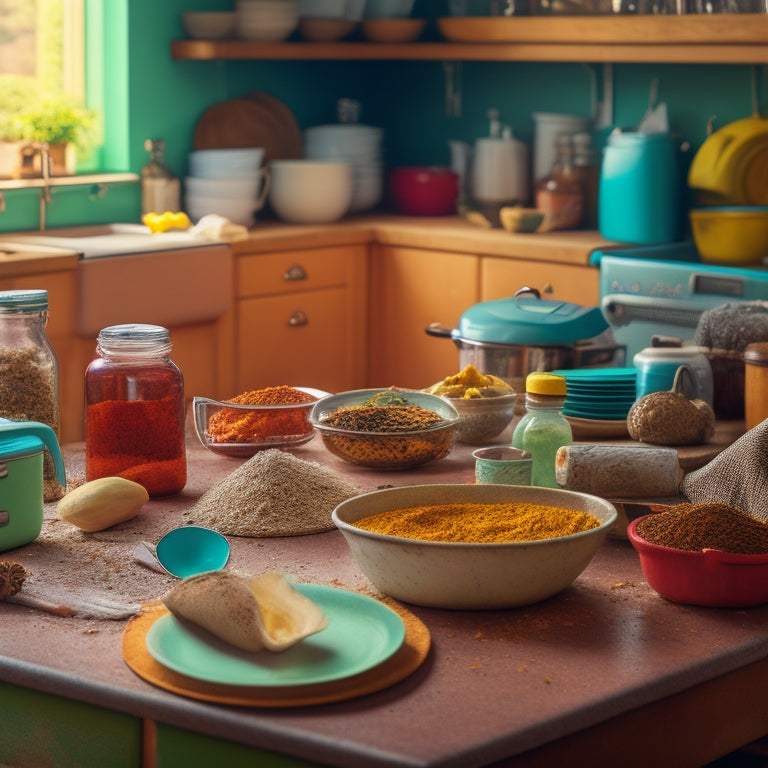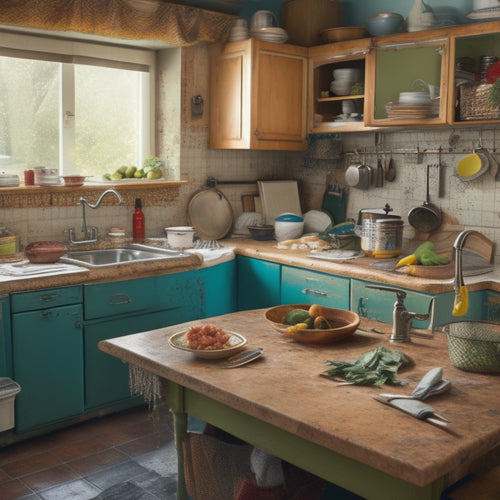
What's Holding You Back From a Clutter-Free Kitchen?
Share
You're stuck in a cycle of clutter and chaos in your kitchen, and it's not because you're inherently messy, but because one or more vital elements are missing from your organizational strategy. You might be lacking a clear vision of what a clutter-free kitchen means to you, or struggling with inadequate storage solutions that leave your countertops cluttered. Poor time management skills, unrealistic expectations, and overwhelming kitchen clutter can also hold you back. Identify the root cause, and you'll reveal the path to a more efficient, peaceful kitchen. Now, take the next step towards creating a space that sparks joy and simplicity.
Key Takeaways
• Failing to define what a clutter-free kitchen means can set you up for failure and make it challenging to create a kitchen that reflects your needs.
• Inadequate storage solutions can lead to cluttered countertops, making it essential to optimize space and create a functional organization system.
• Poor time management skills can lead to clutter accumulation, so prioritizing tasks and allocating specific time slots is crucial for maintaining a clutter-free kitchen.
• Unrealistic expectations can lead to guilt, frustration, and financial stress, making it important to set achievable goals and standards for your kitchen.
• Overwhelming kitchen clutter can hinder cooking and relaxation, emphasizing the need to implement decluttering techniques and maintain balance in your kitchen space.
Lack of Clear Goals
Failing to define what a clutter-free kitchen means to you sets you up for failure, causing you to waste time and energy on futile organizing attempts. Without a clear vision, you'll struggle to create a kitchen that truly reflects your needs and priorities.
Take a step back and ask yourself: what does a clutter-free kitchen mean to you? Is it having a dedicated space for cooking, or being able to find what you need in an instant?
Once you have a clear vision, you can start setting priorities. What's most important to you? Is it having a clean and hygienic space, or being able to host dinner parties with ease? By setting priorities, you can create a roadmap for achieving your goal.
This is where goal setting comes in. Break down your vision into smaller, actionable steps. What specific changes do you need to make to achieve your goal? What actions can you take today, this week, and this month to get closer to your vision?
Inadequate Storage Solutions
With a clear vision and priorities in place, you're now ready to tackle one of the most common obstacles to a clutter-free kitchen: inadequate storage solutions that leave your countertops cluttered and your cabinets bursting at the seams. It's time to optimize your space and create a functional organization system that works for you.
Take a closer look at your current storage setup and identify areas for improvement. Consider the following strategies to maximize your space:
-
Install shelves and hooks: Make the most of your walls and ceiling by adding shelves and hooks to store infrequently used items, such as special occasion dishes or cooking gadgets.
-
Use multi-functional containers: Choose containers that serve multiple purposes, like a utensil holder with a built-in knife block or a spice rack with a built-in cutting board.
-
Implement a 'zone' system: Divide your kitchen into zones, such as a baking zone or a cooking zone, and store items accordingly to reduce clutter and increase efficiency.
Poor Time Management Skills
You're likely no stranger to the frustration of feeling like there just aren't enough hours in the day to get everything done in your kitchen. Between cooking, cleaning, and managing household chores, it can be easy to get overwhelmed.
Poor time management skills can lead to clutter accumulation, making it challenging to maintain a tidy kitchen. To break this cycle, prioritizing tasks and allocating specific time slots for each activity is crucial.
Start by identifying the most critical tasks, such as meal prep, cleaning, and organization. Then, allocate realistic time frames for each task, considering your schedule and energy levels.
Implement time-saving tips, like batching similar tasks, using a 'one-touch' rule for cleaning, and designating specific areas for particular tasks. By streamlining your workflow and maximizing your time, you'll be more efficient and productive, allowing you to tackle clutter and maintain a clutter-free kitchen.
Unrealistic Expectations
Having unrealistic expectations about what you can accomplish in your kitchen can lead to feelings of guilt, frustration, and ultimately, a cluttered space that's hard to maintain. You might be setting yourself up for disappointment by thinking you can whip up a gourmet meal every night, keep your kitchen spotless at all times, or have a Pinterest-perfect kitchen renovation on a shoestring budget.
These high standards can stem from perfectionism, which can be a major obstacle to achieving a clutter-free kitchen. Here are a few ways unrealistic expectations might be holding you back:
-
You're trying to follow a strict meal prep routine that's unsustainable for your lifestyle, leading to wasted food and cluttered countertops.
-
You're spending too much money on fancy kitchen gadgets or decor that you don't really need, creating clutter and financial stress.
-
You're beating yourself up over minor messes or imperfections, making it harder to relax and enjoy cooking in your kitchen.
Overwhelming Kitchen Clutter
Kitchen clutter can overwhelm you on multiple fronts, from countertops buried under appliances and snacks to cupboards stuffed with gadgets and dishes, making it difficult to focus on cooking and enjoying meals. It's easy to feel like you're drowning in a sea of kitchen chaos.
To regain control, try implementing these decluttering techniques and organization tips:
| Area | Challenge | Solution |
|---|---|---|
| Countertops | Cluttered with appliances | Designate a "launching pad" for frequently used items |
| Cupboards | Stuffed with gadgets and dishes | Implement a "one in, one out" policy to maintain balance |
| Pantry | Disorganized snacks and ingredients | Use baskets and labels to create a visually appealing space |
| Sink | Piled with dirty dishes | Establish a daily habit of washing dishes immediately after meals |
Frequently Asked Questions
How Do I Maintain My Kitchen's Organization After the Initial Cleanup?
To maintain your kitchen's organization, you'll need to establish daily routines, invest in storage solutions, and prioritize time management. Set aside 10 minutes daily for decluttering tips and tasks, and you'll be on track to a consistently clutter-free kitchen.
Can a Clutter-Free Kitchen Be Achieved on a Limited Budget?
You can achieve a clutter-free kitchen on a limited budget by utilizing budget-friendly storage options and embracing DIY organization solutions, such as repurposing items you already own or finding affordable alternatives online.
What Are Some Creative Ways to Repurpose Kitchen Items?
"Oh, you think you're a hotshot, don't you? Repurposing kitchen items like a pro! Try upcycling projects, like turning mason jars into utensil holders, or DIY storage solutions, like a spice rack from an old picture frame - voila, clutter-free kitchen, on a budget!"
How Can I Involve My Family Members in Kitchen Organization Tasks?
You'll boost family involvement by assigning tasks, creating a "kitchen team" and setting goals together, fostering teamwork and family bonding while tackling kitchen organization, making it a fun, empowering experience for everyone.
Are There Any Specific Kitchen Zones That Should Be Organized First?
'Rome wasn't built in a day,' so prioritize your kitchen zones wisely! You should tackle pantry organization and fridge decluttering first, as they're essential for meal prep and daily use, making your life easier and more efficient.
Related Posts
-

Why Kitchen Renovation Demands a Meal Planning Strategy
As you prep for your kitchen renovation, you'll quickly realize that the absence of a meal planning strategy is a rec...
